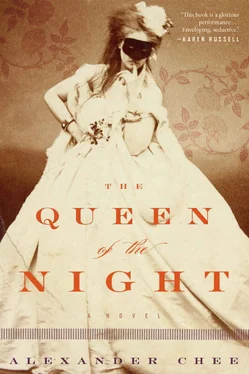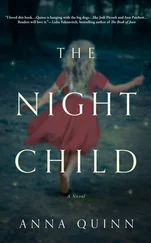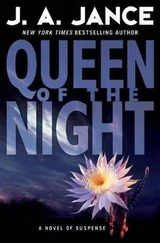We were to have stayed for a fortnight. He had expected to audition other singers, to speak to animal trainers, to meet the orchestra. Instead, we were told we could return the next day.
Who’d have thought the Russians were paupers now, he said, once we were at sea again.
She spent all their money on that sapphire, I said. I should have had you trip her and I’d have snatched it.
The Prussians, he said. Are they so rich?
They are, I said, melancholy to think of it.
It’s said she’s a beauty, he said, of the Empress. What did you think?
I liked the sapphire, I said. What did you think?
I liked the sapphire, too, he said.
§
An opera too expensive for the Russian Empress attracted a great deal of talk; and gossip, sometimes kind, found the composer and his soprano lover returned to Paris the more famous for their defeat in Saint Petersburg, complete with great reviews: My performance of the arias was said to have been astonishing. And wasn’t this likely be the last role to which I would consent?
Aristafeo had taken rooms at Brown’s on our return from Russia, down the hall from my own so as to be closer to me. I listened from within my bed as he read these reports to me, and while I tried to be as amused as he seemed to be, I wondered who had spied on us and how they had traveled back more quickly than we.
He did not wonder. Instead, as he set the papers down, he was all confidence, convincing me of the soundness of his new plan to stage the opera in London after my run in I Masnadieri —with the Empress’s dismissal, we were free of the Baroness’s last favor to him. And so we made the rounds of the British theaters for a week, giving our presentation, and I let go of my curiosity as to our enemies. Our next new future seemed possible, after all, and now our little spy in Russia wouldn’t matter. There was a new lightness to that week, the one I had waited for. But these theaters all eventually rejected the opera as well, in the same spirit as the Russian Empress, complaining of the costs, of having to clean after manure, of animal smells, questions of where the animals could be stabled. All of this was published in the gossip columns with speculation that the failure of the opera to find a home was perhaps related to my voice’s famous curse, and I thought again of that day in Rouen when I entered the Baroness’s château, the garden covered in her deathless roses. The circle of chairs in her ballroom full of opera’s most powerful men.
I knew she could turn them toward him; I knew she could turn them against him.
The wind out of the forest in Rouen that never stops, the chairs turning and turning, for and against, for and against. That wind had reached all the way to the Russian Empress, no doubt the author of her rejection before we had even arrived. And that rejection would be the least of it.
A letter came from Verdi asking me to withdraw from I Masnadieri. The resultant scandal in Paris over my curtsy to Eugénie meant there was an unreasonably hostile atmosphere to me there, and so the production was endangered financially, and did I understand?
At first I did not — the production was to be here in London, not in Paris, but then I did understand all too well. Aristafeo’s Baroness had reached even Verdi.
I wrote back to Verdi and told him that of course I would withdraw from I Masnadieri and offered to withdraw from Un Ballo in Maschera as well. When this letter was ready to send, I called for Doro to send it, and when she did not appear, unlike her, I checked her room.
I found it empty of even her things.
Only a note waited on the empty vanity, addressed to me. The Castiglione insignia was pressed into the red wax seal.
I see you are in London, having found a way to grovel to that woman still. I am writing to say I reviewed our agreement and have taken my price. Our business is now concluded.
To be sure, never return to Paris again.
Nicchia
The curse now the least of my troubles.
I STOOD VERY STILL in Doro’s room, the note in front of me.
I had wondered who Doro had worked for before the tenor hired her, but, of course, Doro could only have belonged all this time to the Comtesse, much as I had. An agent in the tenor’s household, bound there as well.
All those years I had wondered as to the four hundred, the Italian assassins waiting for the Emperor to fail in his devotion to their cause — Doro could only have been one.
Doro, then, good, kind Doro, who always had the answers no matter the question, giver of cards and gin, on her way from the hotel to the train, the train to the ferry, most likely at that instant on a boat back to Paris, the little metal flask in her bags. She would soon be in that apartment on the Place Vendôme, all the windows sealed in black, watching as the Comtesse lit her candles in order to examine her newest gift. I knew how long the trip could take; I had perhaps three days at best before the Paris police would begin their hunt for me, and this was provided they had not already begun.
When the earth opens up under your feet, be like a seed. Fall down; wait for the rain.
Everything you lose you get back.
The fortune-teller’s words mocked me almost as much as the Comtesse’s.
I felt myself dropping, again and again, into that curtsy before the Empress, the skirt of my gown rushing up at me as I kept falling, falling all the way into the underworld, falling down into the darkness.
If only I had worn a veil that night… but I had not. I had wanted a night where he could look at my face in public and not first frown.
That sly pickpocket, love, who will ask you to let down your guard and make a mark of you to the world. What finds you next will take everything and leave nothing.
I resisted the urge to run down into the street, to shriek Doro’s name, to try to follow her and catch her. I knew she was gone; she was surer than I. She always had been. I ran back to my rooms instead.
§
Aristafeo waited there, looking up, faintly cross as I entered. You’re not ready for dinner, he said. What’s wrong?
My maid has left me, I said.
Ring for one from the hotel, he said, as if that would be all of it.
Maids left you, after all, all the time.
I did as he said, and a hotel maid arrived, clucking her disapproval as I explained mine had left suddenly. Did she steal from you? this new maid asked me, and I nearly laughed to think of the answer. She then asked me if I would need her to go through my things with her to be sure they were all there. I found I was afraid of maids now and told her I would do it myself.
I dressed instead, in yet another elaborate mourning costume, this one with a black feather ruff, the bodice shining with black beads, a black fur cuff for the cold, black ostrich shoes that gleamed so that my feet were like that of some even stranger bird, hoping to make myself brave; but this costume was nothing, and as I sat before Aristafeo at dinner, I still felt myself falling, the speed quickening, and the wind of that passage and its growing hush of fear were such that I could not make out what Aristafeo was saying to me, not until he asked, Are you listening? What is troubling you? And I knew I would need to speak to him.
He raised an eyebrow.
The maid still? The Italian one, Doro, the one you’ve had all this time?
Yes, I said. We were close.
Advertise the position at once. I am trying to speak to you of something quite serious, he said. You must write to the Paris police. The papers say they are searching for you, hoping to ask you questions.
So , I thought. There would be less time than I’d hoped .
Читать дальше












